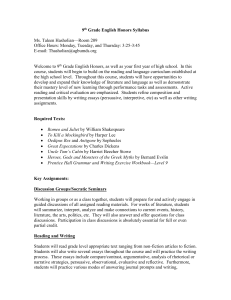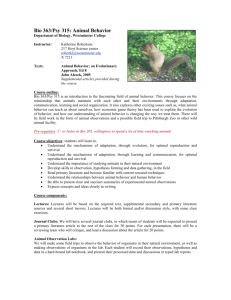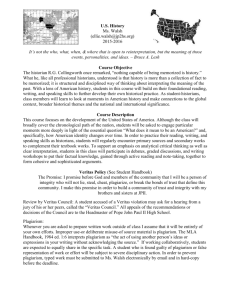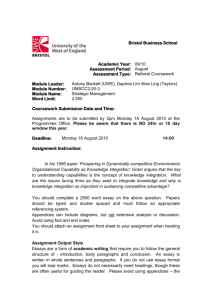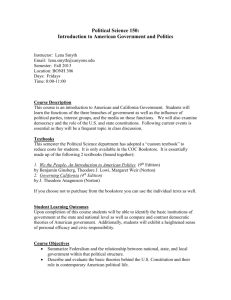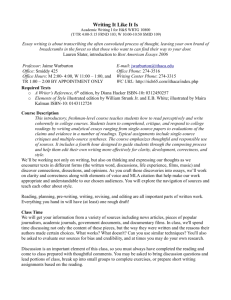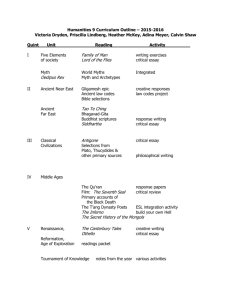Fall 2015: HUM 2220
advertisement
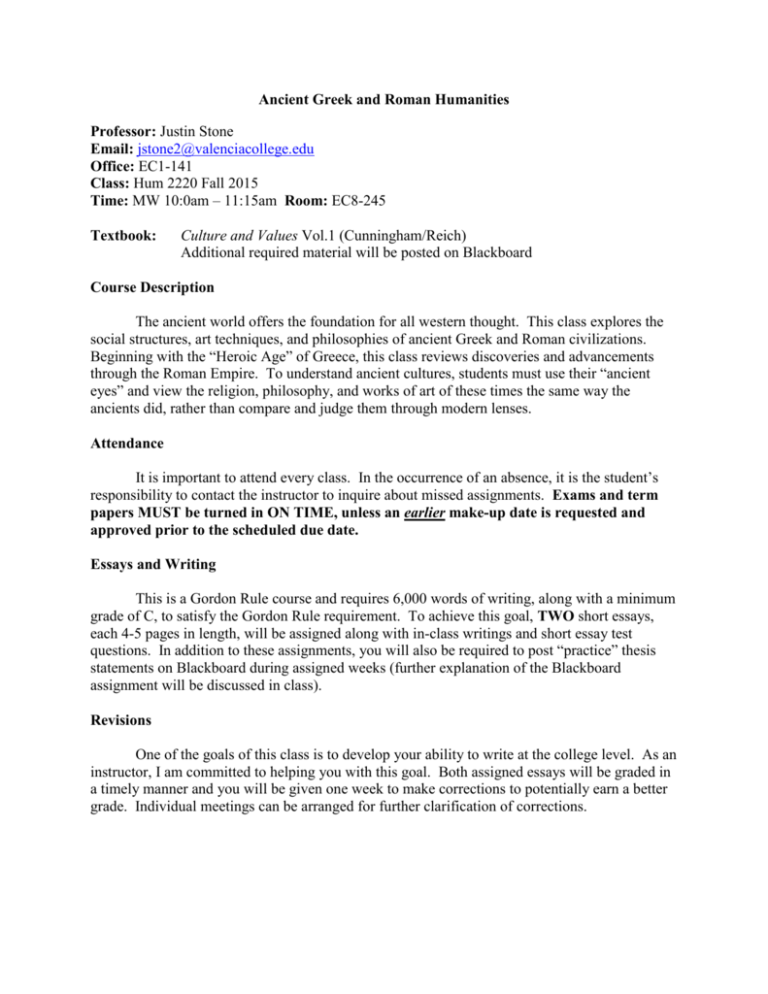
Ancient Greek and Roman Humanities Professor: Justin Stone Email: jstone2@valenciacollege.edu Office: EC1-141 Class: Hum 2220 Fall 2015 Time: MW 10:0am – 11:15am Room: EC8-245 Textbook: Culture and Values Vol.1 (Cunningham/Reich) Additional required material will be posted on Blackboard Course Description The ancient world offers the foundation for all western thought. This class explores the social structures, art techniques, and philosophies of ancient Greek and Roman civilizations. Beginning with the “Heroic Age” of Greece, this class reviews discoveries and advancements through the Roman Empire. To understand ancient cultures, students must use their “ancient eyes” and view the religion, philosophy, and works of art of these times the same way the ancients did, rather than compare and judge them through modern lenses. Attendance It is important to attend every class. In the occurrence of an absence, it is the student’s responsibility to contact the instructor to inquire about missed assignments. Exams and term papers MUST be turned in ON TIME, unless an earlier make-up date is requested and approved prior to the scheduled due date. Essays and Writing This is a Gordon Rule course and requires 6,000 words of writing, along with a minimum grade of C, to satisfy the Gordon Rule requirement. To achieve this goal, TWO short essays, each 4-5 pages in length, will be assigned along with in-class writings and short essay test questions. In addition to these assignments, you will also be required to post “practice” thesis statements on Blackboard during assigned weeks (further explanation of the Blackboard assignment will be discussed in class). Revisions One of the goals of this class is to develop your ability to write at the college level. As an instructor, I am committed to helping you with this goal. Both assigned essays will be graded in a timely manner and you will be given one week to make corrections to potentially earn a better grade. Individual meetings can be arranged for further clarification of corrections. Plagiarism The MLA Handbook for Writers of Research Papers, 5th edition states, "to use another person's ideas or expressions in your writing without acknowledging the source is to plagiarize. Plagiarism, then, constitutes intellectual theft” (30). Examples of plagiarism are: not using quotation marks to designate direct quotes, not citing paraphrased or summarized information from an outside source, and copying or buying papers and essays and presenting them as one's own. Any paper found to be flagrantly plagiarized will receive an automatic F, and the student will be given no chance for revisions. A second offense will lead to academic sanctions including, but not limited to, failure of this course. A citation error is not flagrant plagiarism, but presenting someone else’s ideas as your own is. For more information on plagiarism visit: http://www.indiana.edu/~wts/pamphlets/plagiarism.shtml Classroom Behavior This is a discussion-based class. Often, you will be presented with points of view that may conflict with your own. Academic debate is highly encouraged, but rude and offensive behavior toward any member of the classroom will not be tolerated. This class will follow the guidelines of Aristotle’s Nicomachean Ethics and search for truth in all points of view. Exams The midterm and final exams will be comprised of short answer and essay questions. Notes, books, computers, cellphones, or any other study aids will not be allowed during the exams. Exam questions will come from both the readings and the in-class discussions. Failure to follow test-taking guidelines or an unexcused absence on exam day will result in an automatic F for the exam. Weekly Reading Assignments You are expected to have completed all reading assignments BEFORE the start of class. Demonstrating you have done so during classroom discussions is a part of your Attendance & Participation grade. The exams and written assignments will also center on these readings. Grading Scale A 90-100% B 80-89% C 70-79% D 60-69% F 0-59% Extra credit may be given, from time to time, during class meetings. Blackboard Assignments Exams (2) Essays (2) - 10% - 50% - 40% Schedule of Classes: Week 1: Class introduction, Review of “Heroic Age” history, Art, The Trojan War Week 2: No Class Monday: The Iliad Week 3: The Iliad Week 4: The Iliad, Herodotus’ 300 Week 5: Pre-Socratics, The Art of Proper Citation and the Five Paragraph Essay Week 6: FIRST ESSAY DUE, Introduction to the “Classical Age”, Greek Theatre Week 7: Mid Term Exam, The Agamemnon Week 8: Plato’s Forms and the soul, The Cave Week 9: Plato’s Myth of Er, Aristotle’s Physics Week 10: Aristotle’s Nicomachean Ethics, Poetics Week 11: Introduction to Early Rome Week 12: Art and Architecture of Rome, The Aeneid Week 13: The Aeneid, No Class Wednesday Week 14: The Aeneid SECOND ESSAY DUE Week 15: Juvenal, Roman Politics, Marcus Aurelius Antoninus: The Meditations Week 16: Final Exam *This syllabus is subject to change by the instructor at any time

